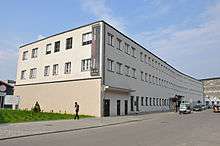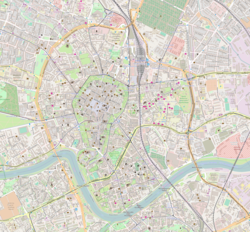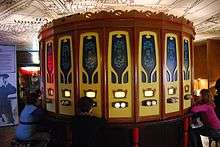Oskar Schindler's Enamel Factory
Oskar Schindler's Enamel Factory (Polish: Fabryka Emalia Oskara Schindlera) is a former metal item factory in Kraków. It now hosts two museums: the Museum of Contemporary Art in Kraków, on the former workshops, and a branch of the Historical Museum of the City of Kraków, situated at ul. Lipowa 4 (4 Lipowa Street) in the district of Zabłocie, in the administrative building of the former enamel factory known as Oskar Schindler's Deutsche Emailwarenfabrik (DEF), as seen in the film Schindler's List.[1][2] Operating here before DEF was the first Malopolska factory of enamelware and metal products limited liability company, instituted in March 1937.
 Former office block of Schindler's enamel factory in 2011, now branch of the Historical Museum of Kraków | |
 Location within Krakow Central | |
| Established | 1937 |
|---|---|
| Location | Kraków, Poland |
| Coordinates | 50.04740°N 19.96175°E |
| Type | History museum |
| Manager | Monika Bednarek |
| Director | Michał Niezabitowski |
| Curator | Monika Bednarek |
| Public transit access | Miejskie Przedsiębiorstwo Komunikacyjne w Krakowie how to get there, see external links |
| Website | www |
History
The company was established by three Jewish entrepreneurs: Michal Gutman from Bedzin, Izrael Kahn from Kraków, and Wolf Luzer Glajtman from Olkusz. The partners leased the production halls from the factory of wire, mesh, and iron products with its characteristic sawtooth roofs, and purchased a plot at ul. Lipowa 4 for their future base. It was then that the following were built: the stamping room where metal sheets were processed, prepared and pressed, the deacidification facility (varnishing) where the vessels were bathed in a solution of sulfuric acid to remove all impurities and grease, and the enamel shop, where enamel was laid in a number of layers: the priming coat first, then the colour, and finally another protective coat.
The ownership of the company changed a number of times, and its financial situation continued to worsen. In June 1939, the company applied for insolvency, which was officially announced by the Regional Court in Kraków.
World War II
On 1 September 1939, Nazi Germany invaded Poland and the Second World War broke out. On 6 September, German troops entered Kraków. It was also probably around that time in which Oskar Schindler, a Sudeten German who was a member of the NSDAP and an agent of the Abwehr, arrived in Kraków. Using the power of the German occupation forces in the capacity of a trustee, he took over the German kitchenware shop on ul. Krakowska, and in November 1939, on the power of the decision of the Trusteeship Authority he took over the receivership of the "Rekord" company in Zablocie. He also produced ammunition shells, so that his factory would be classed as an essential part of the war effort. He managed to build a subcamp of the Płaszów forced labor camp in the premises where "his" Jews had scarce contact with camp guards.
Post-War
After the war, in the period 1948–2002, the factory was used by Krakowskie Zakłady Elektroniczne Unitra-Telpod (later renamed Telpod S.A.), a company manufacturing telecommunications equipment.[1] The Museum has the desk and the stairs from the set of Schindler's List as part of the tour.[2]
Gallery
 In the period 1948–2002, the factory was used by Unitra-Telpod.
In the period 1948–2002, the factory was used by Unitra-Telpod.- Museum building
- Entrance area of the factory in 2013.
 Photos of survivors
Photos of survivors- Desk of Oskar Schindler with a list of Jews saved by him
 Interior installation of Schindler's List
Interior installation of Schindler's List An installation commemorating the destruction of the Kraków ghetto
An installation commemorating the destruction of the Kraków ghetto Interactive screen
Interactive screen Pre-war signs with street names
Pre-war signs with street names Reconstruction of the basement where Jews were hidden
Reconstruction of the basement where Jews were hidden Part of the permanent exhibition
Part of the permanent exhibition Kaiserpanorama/Fotoplastikon
Kaiserpanorama/Fotoplastikon Reconstruction of the tram
Reconstruction of the tram A burned book – symbol of the ghetto
A burned book – symbol of the ghetto Reconstruction of an apartment in the ghetto
Reconstruction of an apartment in the ghetto
References
- Strzala, Marek. "Schindler's Factory in Krakow". krakow-info.com. Krakow Info. Retrieved 25 February 2015.
- "Oskar Schindler's Enamel Factory - Kraków". TracesOfWar.com. STIWOT. Retrieved 26 December 2019.